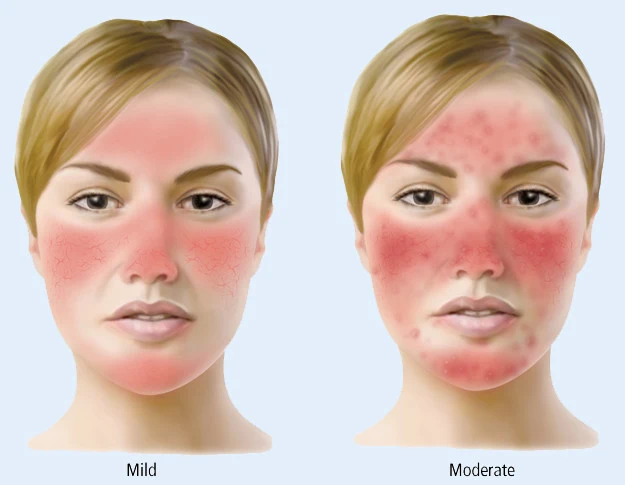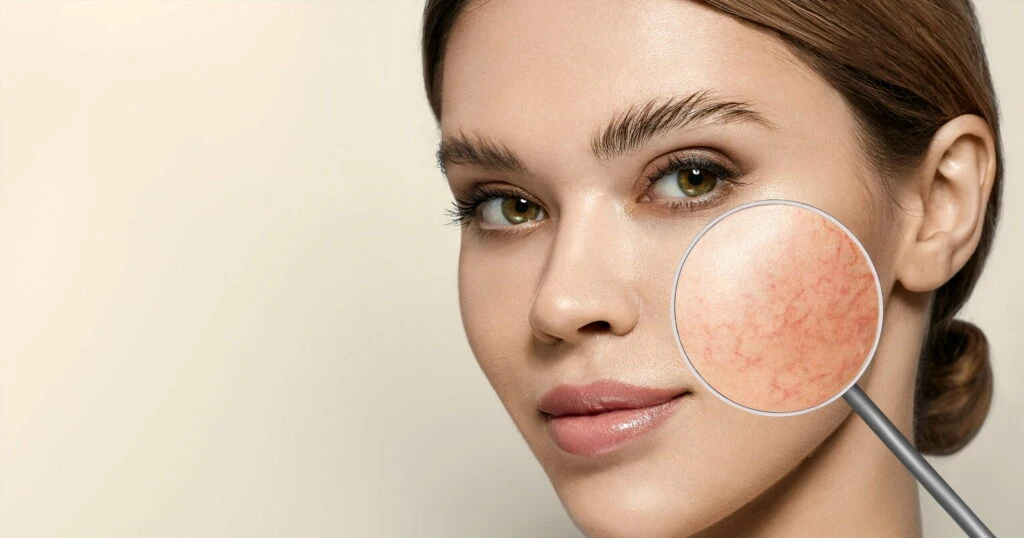Rosacea: What Triggers it, How to Cure It and Some Lifestyle Recommendations
Introduction
Rosacea is a chronic skin condition that predominantly affects the face, leading to redness, swollen bumps, and sometimes visible blood vessels. Often mistaken for acne, an allergic reaction, or other skin problems, rosacea can be a source of emotional distress due to its visible symptoms. While it is most commonly diagnosed in middle-aged women with fair skin, rosacea can affect anyone. Understanding what triggers your rosacea and managing it with lifestyle adjustments and medical treatments can significantly reduce its impact on your life. In this article, we will delve into the triggers, explore effective treatments, and suggest lifestyle changes to better manage this condition.
Understanding Rosacea Triggers

Understanding what triggers rosacea flare-ups is essential in managing this chronic skin condition. Identifying and avoiding specific triggers can significantly reduce the frequency and severity of symptoms.
Common Triggers
Among the most common triggers for rosacea are environmental factors and lifestyle choices. Here is a list of typical triggers that might exacerbate symptoms:
– Sun exposure: Ultraviolet rays can aggravate rosacea symptoms. It’s crucial to use broad-spectrum sunscreen and wear protective clothing.
– Hot and cold weather: Extremes in temperature, especially sudden changes, can prompt rosacea flare-ups.
– Spicy foods and hot drinks: These can increase blood flow to the skin’s surface and worsen rosacea.
– Alcohol consumption: Red wine and other alcoholic beverages often cause flare-ups in many individuals.
– Stress and emotional reactions: Emotional stress doesn’t just affect your mental health; it also can trigger or worsen your skin condition.
– Cosmetic products: Certain skincare and makeup products can irritate sensitive skin and contribute to rosacea symptoms.
Identifying your specific triggers may be a process of trial and error, but doing so can greatly improve your quality of life.
Impact of Triggers on Rosacea Symptoms
When a person with rosacea encounters a trigger, it can lead to a temporary increase in blood flow to the skin that can cause redness, flushing, and visible blood vessels. Over time, repeated exposure to triggers can lead to persistent redness and even physical changes to the skin structure, such as thickening or the development of bumps and pimples. Understanding and managing these triggers can help control the visibility and progression of rosacea symptoms, preserving the skin’s appearance and overall health.
Effective Treatments for Rosacea
Rosacea can be a distressing and persistent condition, but there are several effective treatments available that can help manage symptoms and improve the appearance of your skin. These treatments vary from medications and skincare products to clinical procedures, each addressing different aspects of the condition.
Medications
Medications are often the first line of treatment for managing rosacea and can include:
– Topical creams and gels: Products containing metronidazole, azelaic acid, or ivermectin can reduce inflammation and clear up redness and pimples.
– Oral antibiotics: For moderate to severe rosacea, doctors may prescribe oral antibiotics like doxycycline or minocycline, which help to reduce inflammation and redness.
– Oral acne drugs: In severe cases, isotretinoin, a powerful drug used to treat acne, may be considered. However, it requires close doctor supervision due to its potential side effects.
Each medication has different strengths and side effects, so it’s crucial to discuss these options with your healthcare provider to find the most suitable treatment for your situation.
Skincare Products
The right skincare regimen can significantly affect the management of rosacea. Here are a few tips when choosing skincare products:
– Use gentle cleansers: Harsh soaps can irritate and dry out the skin. Opt for fragrance-free, mild cleansers.
– Moisturize daily: Hydrating the skin can reduce dryness and irritation. Look for oil-free, hypoallergenic moisturizers designed for sensitive skin.
– Be selective with makeup: Mineral-based makeup products are often recommended as they are less likely to cause skin irritation.
Being mindful of product ingredients and how they affect your rosacea can be crucial in preventing flare-ups.
Clinic Treatments
For those who do not respond well to medications and skincare products alone, clinical treatments might be a viable option. These include:
– Laser therapy: Treatments such as intense pulsed light (IPL) or vascular lasers help reduce redness, visible blood vessels, and other persistent signs of rosacea.
– Electrosurgery: This method can be used to reduce the appearance of thickened skin associated with advanced rosacea.
– Dermabrasion: A technique that planing the outer layer of the skin might be recommended for resurfacing and improving skin appearance.
These clinic-based treatments can be targeted and effective for specific rosacea symptoms. However, they should always be performed by qualified professionals to minimize risks and ensure the best results. Consulting with a dermatologist will help determine which clinical treatment is appropriate for your condition and how to integrate it into your overall management plan effectively.
Adopting a comprehensive approach by understanding triggers, applying appropriate skincare products, taking prescribed medications, and possibly undergoing clinical treatments can help manage rosacea effectively. This strategic approach not only helps in reducing the immediate symptoms but also in maintaining long-term skin health and appearance.
Lifestyle Recommendations for Managing Rosacea

Diet and Nutrition
Managing your diet can significantly impact the management of rosacea. Begin by identifying and avoiding foods and beverages that trigger your symptoms. Common dietary triggers include spicy foods, hot drinks, caffeine, and alcohol. Instead, focus on incorporating anti-inflammatory foods into your meals, such as omega-3-rich fish (like salmon and mackerel), nuts, flaxseeds, and plenty of leafy greens. These foods can help reduce inflammation and thus may minimize rosacea flare-ups.
It’s equally important to stay hydrated. Drinking plenty of water helps keep your skin hydrated and may dilute the impact of irritants that pass through your system. Consider keeping a food diary to meticulously track what you eat and drink alongside your rosacea symptoms. This can help you pinpoint specific foods that cause flare-ups, making it easier to avoid them and control your condition.
Skincare Routine
Developing a gentle skincare routine is crucial for managing rosacea. The goal is to minimize irritation that can exacerbate the condition. Start with a mild, non-abrasive cleanser used with lukewarm water, as hot water can further irritate the skin. Avoid scrubbing; instead, lightly wash your face with your fingertips and pat it dry with a soft towel.
Look for skincare products that are specifically formulated for sensitive skin and that are free of alcohol, witch hazel, menthol, and eucalyptus oil, as these ingredients can trigger rosacea symptoms. Sun protection is essential; always apply a broad-spectrum sunscreen with an SPF of 30 or higher as the sun can significantly worsen rosacea. Reapply every two hours, or more often if you’re sweating or swimming.
Lastly, be wary of cosmetics. Mineral-based makeup is often recommended for rosacea patients because it contains fewer irritants compared to other formulations. Always test new products on a small area of your neck before applying them to your face.
Stress Management Techniques
Stress is a well-known trigger for rosacea flare-ups. Implementing effective stress management techniques can therefore play a significant role in controlling your symptoms. Regular exercise is an excellent stress-reducer that not only helps in managing stress but also improves your overall health. Opt for activities you enjoy, such as yoga, swimming, or walking, as they are less likely to feel like a chore.
Mindfulness and meditation have also proven beneficial in managing stress and can be particularly helpful during high-stress periods. Consider integrating a daily meditation or deep breathing routine into your day to help maintain a calm mindset.
Additionally, ensure adequate sleep each night. Lack of sleep can not only increase stress but also worsen rosacea symptoms. Aiming for 7-9 hours of quality sleep per night can help your body recover and reduce stress levels, thereby helping to manage your rosacea more effectively.
By embracing these lifestyle changes—careful dietary choices, a sensitive skin care routine, and effective stress management—you can significantly improve your quality of life despite having rosacea.
Conclusion: Tips for Long-Term Rosacea Management
Managing rosacea effectively requires a consistent and proactive approach. By understanding your personal triggers and adopting a tailored skincare regimen, you can significantly reduce flare-ups and maintain clearer, more comfortable skin. Remember, every person’s experience with rosacea is unique, so it’s important to stay patient and flexible in managing this condition.
– Identify and avoid your specific triggers, which might include certain foods, weather conditions, or stress.
– Use gentle skincare products designed for sensitive skin to avoid irritation.
– Protect your skin from sun exposure by applying broad-spectrum sunscreen daily.
– Consult with a dermatologist regularly to fine-tune your treatment plan as needed.
By incorporating these strategies into your daily routine, you can enjoy a healthier lifestyle and improve your skin’s appearance, even with rosacea. While there’s currently no cure, these management techniques can help you control the symptoms and lead a more confident, fulfilling life.